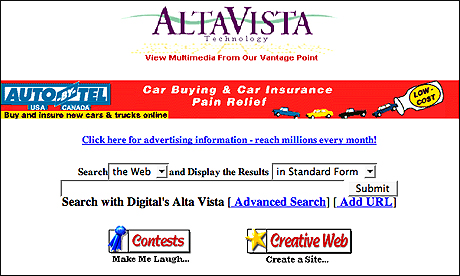What websites do you use every day? Here are the top ten
most-used websites in the world right now (May 21st 2012), according
to mostpopularwebsites.net :
1.
Google.com
2.
Facebook.com
3.
Youtube.com
4.
Yahoo.com
5.
Baidu.com
My regular top five would probably be:
1. Yahoo Mail
2.
Facebook
3.
The Guardian
4.
BBC News
5.
NME.com
My top 5 websites rarely change. I might visit other sites
if I am planning a trip, or if I want to buy something, or research something
in particular. But most days, I go to the same sites (handily book-marked on my
browser), and I’m sure most people do exactly the same. This concerns me. I am
struck by how the range of places we get our information from seems to be
shrinking.
 |
| 'Surfing' in 1996 |
What ever happened to ‘surfing the web’? – that seems so nineties now, using AltaVista or AskJeeves to look for information
from random (often ugly) websites I’d never heard before, and might use only
once. It did feel like I was a surfer, a stumbler, a wanderer. Now, as users
become more savvy and content is herded into a smaller range of sites, we don’t
surf the web as much as do the rounds. We aren’t intrepid, curious explorers;
we are loyal and predictable regulars.
So what, you might say. Isn’t it a sign of the web’s maturity that we know exactly where to find what we want? The problem is that our consumer ‘needs’ are now understood and satisfied so exactly, so accurately, that the joy of serendipity, of ‘stumbling across’ something genuinely new, challenging and exciting, is dying a slow death.
So what, you might say. Isn’t it a sign of the web’s maturity that we know exactly where to find what we want? The problem is that our consumer ‘needs’ are now understood and satisfied so exactly, so accurately, that the joy of serendipity, of ‘stumbling across’ something genuinely new, challenging and exciting, is dying a slow death.
This has always been the case, to an extent. People have
watched particular TV channels, or read particular newspapers, because they
reinforce their political, social and economic worldviews. As someone with
left-of-centre political views, I don’t read The Mail because it makes me
angry. The same can be said of my Thatcher-loving father, who would, at even
the quickest glance at the ‘socialist’ Daily Mirror’s front page, turn an
ironic shade of red.
I’m not talking about changing people’s political views (although, in a lot of my family’s cases, the chance would be a very fine thing). But even within ‘our own’ particular newspaper, there is something about the print format which makes it far easier to ‘come across’ articles which we probably wouldn’t choose to click on if we to use a web-based version.
I’m not talking about changing people’s political views (although, in a lot of my family’s cases, the chance would be a very fine thing). But even within ‘our own’ particular newspaper, there is something about the print format which makes it far easier to ‘come across’ articles which we probably wouldn’t choose to click on if we to use a web-based version.
I remember flicking through my copy of The Guardian when I
worked at a University in Leeds (and could get a discounted student copy), and
on my way to the columns - where I could read George Monbiot or Polly Toynbee or someone
else who would eloquently reaffirm my pre-existing beliefs... kapow! blessed serendipity
could strike!
 |
| Well done if you avoided this picture |
I might come across the World News section, and find myself reading about, say, war in Sri Lanka, political upheaval in Sub-saharan Africa, or drought in Australia – things I might not, in all honesty (despite my claims to being an internationalist humanitarian), choose to look at. But reading about such stories enriched my understanding of the world, and made me realize that there were more important things going on than, say, how David Cameron reacted when he saw Chelsea win the Champions League final on TV (in case you were wondering, he… cheered).
Now, things are different. I have my Guardian app on my smartphone, specially personalized/filtered to give me the stories ‘I want’, without all that inconvenient turning of pages. AND it’s free, and fast, and it makes me fit in with my peers on the subway. Progress!
Living in Korea, the feeling of having my content filtered
is even more stark. I can’t watch UK TV, so I can’t channel-hop, or check how
different TV channels report the news differently. I also can’t flick through
the headlines of different newspapers in my local corner shop.
Of course, circumventing The Media, there is still good old
word-of-mouth, and facebook does serve a very useful purpose in allowing
friends to share opinions, links, articles and videos. But, generally, we
associate online with people who have similar opinions, read the same things,
like the same music.
Think: how many people do you communicate with online that
you fundamentally have nothing in common with (relatives don’t count)? Unless
you are one of life’s few natural conflict-seekers (AKA: a shit-stirrer), the
answer is probably Zero. And if you are a shit-stirrer, you’d better be a funny
one, or you won’t keep your facebook ‘friends’ for long.
We all have our own little patches of the web, divided up by
invisible boundaries of class, language and political outlooks, and when people
stray from their ‘cyber territory’, things can get rather heated, to say the
least. If you don’t believe me, take a look at the comments section whenever a
Tory writes an article for the Guardian.
Of course, we are all independent people. We have the
freedom to look on any website we want, don’t we? Well, make a note of your top
5 websites. See if they change in the next month. Do you use stumbleupon.com
more than once? Me neither.
| "Excellent" - Roger Tyers |
People are generally lazy and will stick to their default
mode (incidentally, this a phenomenon well explained by the excellent book ‘Nudge’
which I recently finished reading). The problem, as I see it, is that
technology is catering only too well to this human tendency for laziness, and
is in danger of making people even less open and receptive to new influences
than before.
The internet provides the opportunity for access to so many different voices, but now, with smartphones and apps, we don’t even need to open a browser. App’s provide us with conveniently-selected content so we don’t have to search for ourselves.
Corporations have always controlled the Media, often with less-than-benign financial or political motives, yet at least the format of (pre-on demand) TV, radio, newspapers and libraries meant you had a chance of stumbling across something new, something which might make you think about a subject, a place, or people who you never considered before, and might, just might challenge or change your beliefs.
The internet provides the opportunity for access to so many different voices, but now, with smartphones and apps, we don’t even need to open a browser. App’s provide us with conveniently-selected content so we don’t have to search for ourselves.
Corporations have always controlled the Media, often with less-than-benign financial or political motives, yet at least the format of (pre-on demand) TV, radio, newspapers and libraries meant you had a chance of stumbling across something new, something which might make you think about a subject, a place, or people who you never considered before, and might, just might challenge or change your beliefs.
As radio, newspapers, TV stations, and libraries see their
markets decline steadily, and the internet becomes increasingly automated and individualized,
where is the space for serendipity now? Don’t get me wrong, this is not a time
for nostalgia for the past, but this a time to recognize that in the future, we
will have to be more active users of our Media, lest we become even more
spoon-fed, even less critical consumers than
ever before.
 |
| Add caption |
Why does this matter? I would argue that in our complex, globalised
and ‘post-ideological’ societies, there is even more need for people to move
outside of the old left-wing/right-wing, socialist/conservative dichotomy which
has dominated the Media and public discourse for the last century.
Simply, there are many pressing issues which cannot be
solved by retreating to our ideological comfort zones – comfort zones which the
Media help perpetuate. Should we intervene militarily to help the insurgents in
Syria? Should we use nuclear power to reduce carbon emissions? How should we reduce
government deficits without crippling our economies? How can we prevent another
banking crisis without without hobbling the banks? These are questions for
which we need to be as open-minded and well-informed as possible, and for which
the pre-packaged ideologies of Socialism, Liberalism or Conservatism offer few
obvious solutions.
I am concerned that the modern media and modern technology is making people even more politically and socially polarized than ever before, just when the need for consensus and collective thinking in the face of huge global challenges has perhaps never been greater. A little serendipity could go a long way.
I am concerned that the modern media and modern technology is making people even more politically and socially polarized than ever before, just when the need for consensus and collective thinking in the face of huge global challenges has perhaps never been greater. A little serendipity could go a long way.
You should re-write that Procol Harum track, and call it 'Ironic Shade of Red'.
ReplyDeleteJak
Good piece, by the way - I completely agree. I knew i would, that's why i read it in the first place.
ReplyDeleteJak
haha, happy to help re-affirm your opinions!
ReplyDeletecheers Jak
This Post Is Very Informative. I Like It Very Much.
ReplyDelete